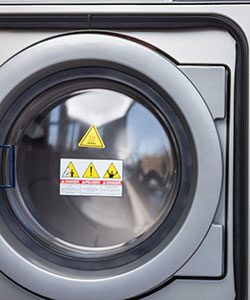
5 Tips to Help You Prevent a Clothes Dryer Fire in Your Home & What to Do if it Does Catch Fire
An estimated 2,900 clothes dryer fires are reported in the United States every year, according to the U.S. Fire Administration. Although clothes dryer fires don’t happen in every American home, they still pose a potential threat to not only you and your family’s safety but your home’s belongings and structure. These types of fires are not only dangerous but can cost homeowners millions in repair. The average price for fire damage repairs is between $3,028 and $27,662.
Avoid the dangers of clothes dryer fires with these five tips and call an expert fire damage repair company to restore your home if your dryer does catch on fire.
-
Clean Lint Filters After Each Load
It cannot be stressed enough that you should always clean the lint filter before tossing in a new load of laundry. If a lint filter isn’t cleaned after each load, it can cause a build-up of lint that could potentially become a fire hazard. Even if there’s only a small amount of fluff on the filter, you should clean it anyway to keep up with the habit.
Not only does cleaning your dryer’s lint filter help prevent a fire, but it can also optimize your dryer’s performance and help your laundry dry faster.
-
Clean Dryer Ducts Once a Year

At least once a year, it’s a smart move to take a look at your clothes dryer’s ducts. You can often find blockages of lint in or around your dryer’s ducts. Take the time once a year to disconnect the power from your dryer, and if you have a gas dryer, also shut the valve, then inspect and clean the back of your machine.
Use a cloth rag and a broom to sweep up the lint resting inside and out of the ducts. Lint will find any nook and cranny to build up in.
-
Use Care When Handling Chemical Stains
It’s easy to throw a stained garment into the dryer without considering how the stain could react to intense heat, but you can never be too safe when it comes to preventing a clothes dryer fire in your home. Clothes get all kinds of stains on them – including gas, cooking oil, cleaning agents, or other flammable chemicals.
The Consumer Product Safety Commission recommends washing chemical stained clothing more than once to minimize the substances, then hanging them to dry. Putting these clothes in the dryer risks the possibility of the dryer overheating and sparking a fire.
-
Keep the Area Around Your Dryer Clean
The last thing you want to do is feed a dryer fire with flammable items. Wherever you keep your dryer in your home, be sure to keep the area around it clutter-free. Your laundry space may seem like an excellent place to use as storage, but it’s not when you consider the risks. Avoid storing cleaning products, boxes, and other highly flammable items near your dryer.
-
Don’t Overload Your Dryer

It’s easy to let dirty laundry pile up and then overload your clothes dryer in an attempt to catch up on it. Even if it feels like a good idea, you could be putting yourself and your home at a higher risk. Split your loads up, so your dryer doesn’t go into overdrive. The more clothes that are in the dryer, the longer it takes to dry and the hotter it gets. Overheating could potentially lead to a fire sparking inside your home.
Restore Your Home from a Dryer Fire with CLEAR Restoration
If your dryer catches fire, grab the fire extinguisher and put it out carefully. Then call CLEAR Restoration for fire damage restoration. Our team is experienced and addresses your restoration concerns quickly. We make sure your property is safe and do any necessary emergency or temporary fixes before building out a full restoration plan.
You can rest assured when CLEAR Restoration experts are there to help you put your home and life back in order. Contact CLEAR today to start recovering from your clothes dryer fire.



